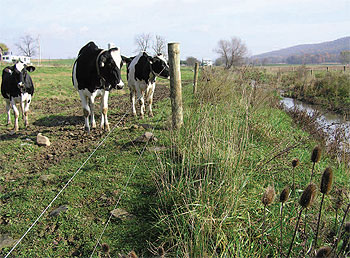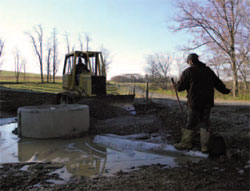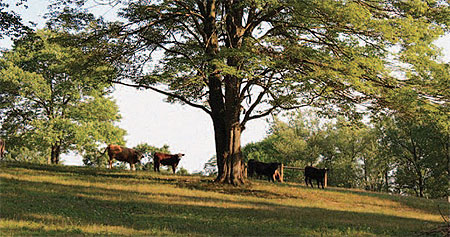WPC Helps Rural Communities Protect Rivers and Streams
Keeping waterways clean while keeping farms productive is a top priority for the Western Pennsylvania Conservancy. WPC’s Watershed Conservation Program helps agricultural producers implement best management practices that reduce sedimentation, nutrient overload and other impacts to the region’s rivers and streams.

In addition to being a key tool for improving the water quality, streambank fencing helps keep livestock healthier.
“All of the big rivers leading to Pittsburgh start as small tributaries flowing through forests and farmlands,” said Alysha Trexler, WPC’s watershed scientist. “It’s the owners and caretakers of these farms that have the first opportunity to make the right decisions in water quality management while still making a living.”
Specific areas of geographic focus for this work have been the Shenango and Juniata rivers, and Loyalhanna, Little Mahoning and Sewickley creeks, because of the many agricultural producers that operate near these streams. Since 2001, more than 500 farms have received technical assistance and/or funding from WPC and its partners with a total value of approximately $3 million.
WPC has helped farmers reduce the amount of nutrients running into nearby creeks by installing stream bank fencing, stabilizing stream crossings, and informing farmers about best practices for managing manure. They also plant native grasses and shrubs near creeks to create buffer zones to help prevent sediment, nutrients and other pollutants from entering the water. “Even simple changes, like installing gutters on barns, can have a big effect on water quality in a stream. As farmers become better stewards, they also realize cost savings they may never have associated with conservation practices before,” said Trexler.

WPC staff members help install an alternative watering source for livestock on a dairy farm in Indiana, Pa.
These improvements have the added benefits of helping farmers maintain healthy livestock, improving efficiency, and even upgrading the look of the farm. Keeping cattle out of streams and providing them with alternative water sources in the field, for instance, reduces the risk of hoof rot and udder infections, and that can mean fewer veterinary bills. “Healthier cows have healthier calves and produce more milk. With each farmer’s success, neighbors who initially may be reluctant to embrace change become open to new practices,” she said.
The Juniata River is a key tributary to the Chesapeake Bay, the nation’s largest estuary and one of its most beleaguered. WPC is helping the many farmers and other rural land users to reduce nutrient overload and stream bank erosion on its tributaries, including Aughwick and Kishacoquillas creeks, and Piney and Clover creeks on the Frankstown Branch of the river.

Rotational grazing, as practiced on this farm in Indiana County, can improve the productivity of a farm and reduce the amount of sediment and nutrients that enter waterways.
“So far we’ve worked with more than 50 farmers on stream bank fencing and other improvements in the Juniata River watershed, but waterways in this area are so impaired, more work is needed,” said Jennifer Farabaugh, WPC’s Juniata and Potomac watershed manager.
Streambank stabilization has been performed on tributaries to Kishacoquillas Creek, including Treaster and Buck Runs and Tea Creek, Farabaugh said. WPC is also currently helping 20 farmers install stream bank fencing and barnyard improvements near two important fisheries, Piney and Clover creeks, in an area known as Morrison Cove.
